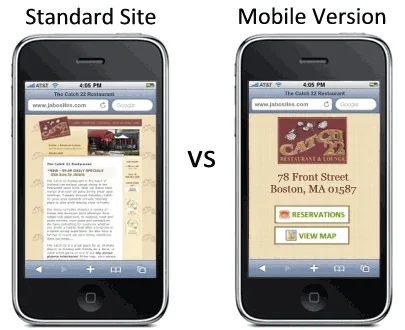Here we will look at the importance of mobile optimised websites otherwise known as website responsiveness, and understand why our company have begun building websites for mobiles since 21st April 2015.
What is a Mobile Optimised Website?
When a visitor to your website is using a smartphone to access your website, your website will automatically respond to the smartphone’s small screen size. If a visitor is using a tablet such as an iPad to go to your website, the website will automatically re-size to that device’s screen size.
The layout of your website that you see on your desktop is not the same layout as the one visitors see on their smartphones, but rest assured this is a good thing.
Why Mobile Optimised Websites Benefit Your Search Engine Rankings
As Google is the one who is in charge of the search engine rankings, these are the guys we want to please.
The job of the people working for Google is to make sure a website visitor’s experience on a website is as smooth and clean as possible. Therefore mobile optimised websites get first dibs.
If your website isn’t mobile friendly then your mobile friendly competitors will have the advantage in the search engines.

One of the questions the Google employees’ ask is, “Is the website responsive?” If the answer comes back, yes, then they will like you, if the answer is no, then they will favour your competition who have responsive websites. Mobile optimised websites is one of the major factors Google takes into account when determining who deserves to be on page 1.
A Google update dubbed ‘Mobilegeddon’ on the 21st of April 2015 saw thousands of websites drop out of the search engine’s rankings because their website was not mobile responsive. It was a devestating Armageddon for website owners who didn’t optimise their website for mobile and tablet users.
How Do Mobile Optimised Websites See an Increase in Conversions?
The major factor in a website’s successful conversion rates is whether or not the website is responsive. A study found 4 out of 5 smartphone users in the U.S had made purchases on their smartphone. Britain isn’t far off that figure with 32% of all online purchases coming from a smartphone. The number of users waiting to get home and get on the PC to make a purchase is decreasing.
However, smartphone users are the quickest to leave an e-commerce store with 84% leaving after landing on a page compared to 68% on desktop. This isn’t because they’ve landed on the wrong website, in most cases it is because the website owner hasn’t optimised their website for mobile. Therefore losing out on potential sales.
With mobile optimisation being a major factor in competing for page 1, it is safe to say that by investing just a little bit extra in mobile optimisation you will unlock more potential on your website and definitely see a return on investment.
For further insights and guidance, we invite you to explore our blog at 07hm.co.uk/blog. Here, you’ll find a wealth of information tailored to the needs and challenges of SMEs navigating the digital landscape. Additionally, if you have specific questions or need personalised advice, don’t hesitate to reach out to us via email at info@07hm.co.uk or telephone on 01702 410663.






